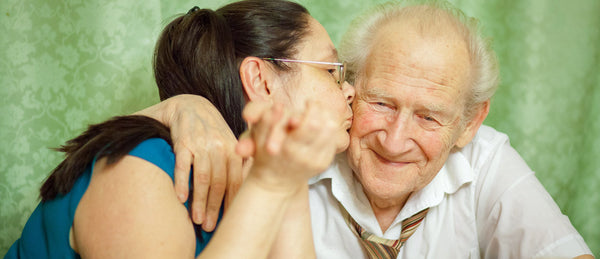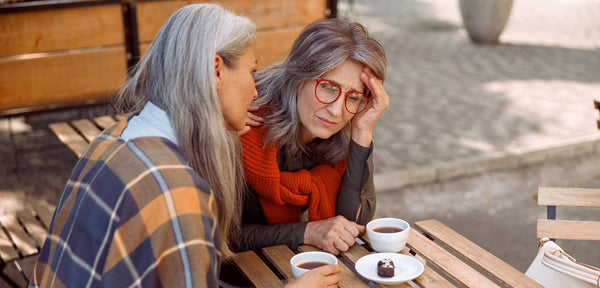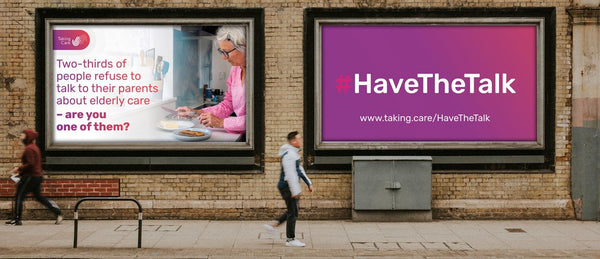If you have an older parent, grandparent or another loved one who is elderly and lives independently, it’s very common and natural to worry about them when you’re not around, especially if they live alone. What might happen if they have a fall or another kind of accident? Will they be able to reach help if they need it?
In this article, we look at alarm systems for the elderly, the technology and features that they offer and the potential benefits of monitored alarms for older adults to help them live a full and independent later life with confidence.
Jump to:
- Why consider monitored alarm systems for the elderly?
- Different types of alarm systems for the elderly
- Different personal alarm features and benefits
- Choosing the right elderly alarm for your circumstances
Why consider monitored alarm systems for the elderly?
If your elderly loved one lives independently but you’re a little worried about them or what could potentially happen when you’re not there with them, a monitored alarm system for the elderly can offer real peace of mind.
Your older relative or friend may have experienced a fall, an accident or a medical event in the past, or could be in recovery, and both you and they will feel more confident if there is something in place that can send an alert if something happens again.
Alternatively, it might be that your elderly loved one is becoming increasingly frail or has started having some issues with balance, eyesight or managing around the home, so you want to know that help is at hand if it’s needed.
Another reason why monitored alarm systems for the elderly can make a real difference is if your older loved one is very active and likes to be out and about on their own at times.
An elderly alarm system that is GPS-enabled means that wherever they go in the UK, their location can be found if an alert is raised.
There are various other reasons why alarms for the elderly can be very useful, and having 24/7 monitoring means that there is always someone available to help, no matter what time of the day or night.
Having a monitored alarm enables the experienced resolution team to take the best course of action if an alert is raised. Whether that’s calling the emergency contact listed, family members of the alarm wearer or the emergency services, the response team is trained to handle these types of events and can ensure that help is arranged as quickly as possible.

Different types of personal alarms: in-home wrist pendant, fall detector and mobile GPS alarm
Mobile phone vs personal alarm
It might seem that having a mobile phone is a good option in case of emergency. However, mobile phones do have drawbacks and an alarm could be a more reliable and easier-to-use solution for raising an emergency alert.
Different types of alarm systems for the elderly
There are various different kinds of alarm systems for the elderly available on the market today. Along with elderly fall alarms that detect when the wearer has a fall automatically, straightforward elderly panic alarms which raise an alert with a single button press and wrist alarms for the elderly with GPS that work when out and about, there are now also smart elderly monitoring systems for UK homes that use advanced technology to detect when something might be wrong.
The key for anyone considering alarm systems for the elderly is to work out what the features are that will make the most difference to the older person and their quality of life, as well as their ability to reach help if it is needed.
Different personal alarm features and benefits
There are a huge range of different features offered by various personal alarms, ensuring that there is a product that’s a good fit for every kind of situation. Some of the most popular features in a monitored alarm system for the elderly include:

A comfortable alarm pendant or watch that can be worn all the time
As a personal alarm is designed to be worn at all times so that it’s always within reach, it needs to be comfortable, practical and not inhibit the normal daily activities of the wearer.
At TakingCare, we have monitored alarm systems for the elderly that are available as pendants that are worn around the neck, or as a wrist alarm, just like wearing a watch. The wearer can choose an alarm that best suits their own preference and lifestyle.

Works in the garden as well as the home
Many older people love to spend time in their garden or outside space as well as indoors, but there can sometimes be additional hazards and challenges when gardening for older adults.
Having an elderly alarm system that works when the wearer is in the garden as well as inside the home can be really useful. At TakingCare, even our alarm pendant or watch systems designed for the home will also work in the garden.

Has GPS, for use when out and about
Many older people enjoy spending time outside of their home, whether socialising, running errands, taking some exercise and fresh air or going away for a UK holiday. An alarm system for the elderly that works when the wearer is out at the shops, enjoying a countryside walk or anywhere within the UK can be really useful, as it means that help can always be reached if needed.
The GPS technology integrated into the wearable device means that the wearer’s location can be pinpointed if they need assistance.
Waterproof, so can be worn in the bath or shower
Falls, slips and accidents are unfortunately common in the bathroom. It’s therefore essential that an alarm system designed for use if there is a fall or incident is able to be taken into the bathroom so that it’s within reach if needed.
Long battery life
If a personal alarm is being charged or if the battery runs out and needs to be replaced, it can sometimes leave the wearer vulnerable if they don’t have a second device to wear at these times. Therefore, having a long battery life is an important feature for many monitored alarm systems for the elderly, along with providing an additional device for those systems where regular recharging is required.
At TakingCare, many of our alarms have a battery life of between 2-5 years, and we will be notified if batteries are running low so that we can organise a free replacement.
Works with or without a landline
Depending on the alarm system chosen, some require a landline in the home and some can be used without a landline. If your elderly loved one has a landline in their home and wants the personal alarm to use this, there is also the upcoming digital switchover to consider when thinking about which alarm system to choose.
At TakingCare, many of our alarms don’t require a landline in order to work so they can be used in lots of different settings and homes and won’t stop working after the digital switchover.
Automatic fall detection built into the alarm
For older adults who have had falls previously or are increasingly at risk of a fall due to another reason, such as developing balance issues, dizziness, sight loss or difficulties with judging distances, a personal alarm with fall detection built in means that even if the alert button isn’t pressed, the device can detect hard falls. Therefore, if the wearer isn’t able to press the alarm button after a fall, the alert is still raised and the resolution team contacted to assist.
Smart technology that unobtrusively monitors the home and alerts if anything unusual happens
Many people in their later years tend to stick to a daily routine most of the time, and if something in that routine changes, it can indicate that there is perhaps a problem that needs some intervention.
Some personal alarm systems use smart technology to monitor the home and learn routines using Artificial Intelligence (AI), with no intrusive cameras or microphones, so that if something changes or something unusual happens, the designated contacts can be notified.
An example is that if the older person normally uses their kettle and fridge frequently throughout the day, but suddenly stops doing so as much, it can be a sign there is something wrong. These systems can also use temperature monitors to signal if the temperature is higher or lower than normal, which can also indicate there is an issue that needs looking into.
Incorporates fire safety considerations
Fire safety is often a concern for family and loved ones of an elderly person living independently. Thankfully, as well as temperature sensors in smart home alarm systems, smoke alarms in the home can also be monitored. This means that if a smoke alarm is triggered, an alert is raised and, when paired with a pendant or watch alarm, it offers a wide range of cover for an older adult. Find out more about home monitoring systems for the elderly.

Choosing the right elderly alarm for your circumstances
Everyone is different, so the things that they might want and need from monitored alarm systems for the elderly can vary. With lots of different personal alarm products available, it can feel like there are so many options and it’s not always straightforward to work out which will be the best fit for your loved one and their lifestyle.
Monitored personal alarms
Our customer service team are here to help and make sure that you choose the alarm system that will offer the features that are right for your situation. You can give us a call on 0800 085 7371 for tailored assistance.






